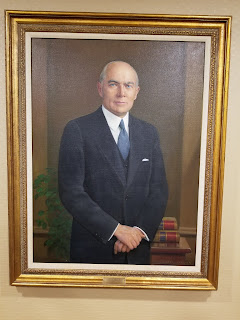Hatton W. Sumner was a leading figure in fighting the passage of anti-lynching legislation in the first half of the 20th century. He was involved in fighting the passage of the Dyer bill in 1922 and Costigan-Wagner Act in 1937. He represented Dallas in Congress from 1914 to 1946.
This is about Hatton W. Sumners' opposition to the Dyer Bill.
https://history.house.gov/Exhibitions-and-Publications/BAIC/Historical-Essays/Temporary-Farewell/Anti-Lynching-Legislation/
This is the minority report against the Dyer anti-lynching bill. Note that Sumners is the first listed author.
https://www.loc.gov/resource/dcmsiabooks.antilynchingbill00unit/?sp=18&r=-0.51,0.262,1.977,1.098,0
This references the opposition to later anti-lynching legislation.
http://srvhs.org/Staff/teachers/jdavis1/HUSH/New%20Deal%20Articles/NAACP%20and%20Anti-Lynching%20Law.pdf
I have been going through his papers, and Sumners collected accounts of lynchings, not to understand why federal legislation against lynching was needed, but to better able to oppose federal anti-lynching legislation. He was a monster.
However, if you look at the entry in the Texas State Historical Association (TSHA) handbook for Hatton W. Sumner, one of the longer entries, you will find no mention of lynching or anti-lynching.
https://tshaonline.org/handbook/online/articles/fsu04
Not a word about Sumners' role against anti-lynching.
The entry says:
He is best remembered for his opposition to President Franklin Roosevelt's court-packing plan of 1937, and his comment, "Boys, here's where I cash in my chips," is part of congressional lore. In the court-packing fight, Sumners's strategy was to do nothing, thereby keeping the President's plan bottled up in the Judiciary Committee and forcing the administration to fight the battle in the Senate.Probably one reason he is "best remembered" for this one thing is because the Texas State Historical Association has chosen to erase Sumners opposition to federal anti-lynching legislation from the entry.
The entry also says:
The election law sponsored by Representative Alexander W. Terrell and enacted by the legislature in 1903 incorporated many of Sumners's recommendations.If you dig through enough entries the TSHA handbook does explain what Terrell's election law was about in the TSHA entry for "White primaries."
The Populists soon faded as a significant force, but white leaders began to search for ways of assuring white unity and hegemony. Governor James S. Hogg and state representative Alexander W. Terrell supported legislation to require and regulate primaries. They wished to counter vote fraud and believed that blacks should be excluded from Democratic primaries. Terrell's primary legislation was passed in 1903 and amended frequently thereafter.If you want to research the history of race and racism in Texas you need to be very wary in the use of the TSHA handbook. Stuff is not there and unless you already know the history you don't realize it is missing. There are other problems also.
People think that racism exists because of extremists, but it is things like the TSHA handbook are much more important in maintaining systems of racial discrimination than small fringe groups.
In going through the Sumners' records you find that he was an opponent of any and all federal civil rights legislation.
Another place where you won't find anything about Sumners' opposition to federal civil rights legislation and federal anti-lynching legislation is the website of the Hatton W. Sumners Foundation. There website is:
http://www.hattonsumners.org
They are located in Dallas.
They have this page titled, "Hatton W. Sumners Library," were you are toled that it "is your opportunity to learn more about Congressman Sumners' life, career and beliefs."
http://www.hattonsumners.org/sumnerslibrary.htm
That is true, if you don't know much about Sumners you will learn about some of his beliefs. You won't learn anything about his opposition to federal anti-lynching legislation and federal civil rights legislation.
The TSHA and the Hatton W. Sumners Foundation are symptomatic on how Texas works in representing Texas history.
Incidently I don't want any illegal activities directed at the foundation so they can't play the victim.
The Dallas Morning News, (DMN) 4/16/1937, article, "House Passes Antilynch Bill despite Sumner's Hot Fight," pages 1 and 9, give a fairly good picture of Sumners' role in defeaing federal anti-lyching legislation.
Representative Hatton W. Sumners (Dem.) of Texas, chairman of the Judiciary Committee, led the Southern opposition to what he termed pestiferous interference of the North in a problem he said the States already are solving.
"Leave us alone and tend to something you knwo something about," Sumners shouted,waving clenched fists at the Republicans. He argued passionately more than forty minutes. The members rose spontaneously to prolonged applause as he sat down.The key word is "led." Sumners "led" the opposition to the anti-lynching legislation.
The DMN noted that Sumners led the fight against the Dyer Bill 15 years ago. In an article, "Maverick Votes for Bill," on page 9, following immediately the aforementioned article, the DMN states:
The bill was assailed by Representative Hatton W. Sumners of Dallas, chairman of the Judiciary Committee and Representative Luther A. Johnson of the Corsicana district. Sumners led his fight against the bill as he did fifteen years ago when he fought the Dyer bill on the same subject.The DMN reports that he "led" the fight in 1937 as he led the fight in 1922 against the Dyer bill.
However, being a racist enabler of lynching doesn't repulse Texas cultural institutions. A quick search on the Internet will show that many major institutions are willing to take money from the Hatton W. Sumners Foundation despite its horrible white washing of history.
One of those institutions is the Texas Tribune which took money for its Texas Tribune festivals.
https://festival.texastribune.org/sponsors
This is the webpage for the festival which takes place in Sept. 2019.
https://festival.texastribune.org/
I am mailing a certified letter asking them to give the money back. If they don't or there is some evasion by the Texas Tribune, I am going to be writing scheduled participants for the 2019 Festival not to attend.
The following is the letter I am sending by certified mail. NOTE that though the letter doesn't include the Sixth floor in the address the letter's address did include the sixth floor as shown by the receipt above.






No comments:
Post a Comment